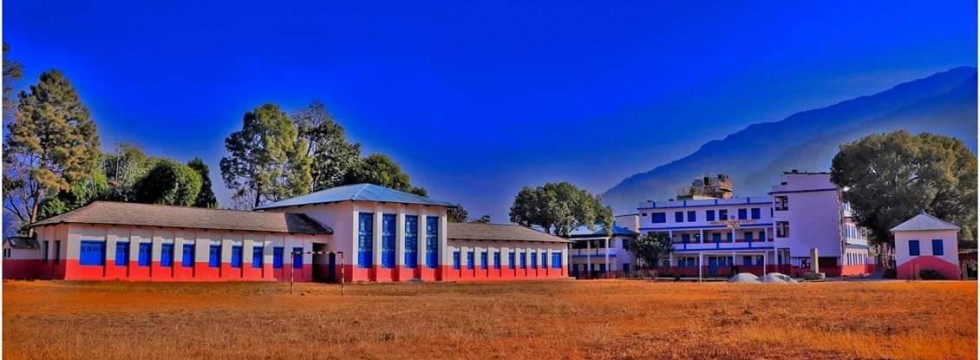
Dhawalagiri Multiple Campus (DMC) was established in 2019-Bhadra 2 (1962-08-18 A.D.). The prime goal of establishing this campus is to offer higher level studies according to the need and expectation of the people of Dhawalagiri area. Along with the aspiration of generating awareness, DMC aims to prepare the competent man power necessary for accomplishing development activities and delivering efficient administrative, educational and social services in the local area and throughout the country as well.
In its early years, the classes were held at Bidhyamandir Secondary School, a reputed high school in the headquarter of Baglung. It was only in 2022/23 BS that the campus was relocated to the present location, the eastern edge of the upper plate of Baglung Bazaar in Baglung Municipality, ward No. 2, a panoramic and tranquil area, about 2 hundred metre above the North-East bank of Holy river, Kaligandaki and about 275 km west of Kathmandu. The campus compound, spreading over an area of 88-2-2 Ropanies of land, is bordered with mid hilly highway on the north east and Jeep Park area, the busiest shopping spot of Baglung Bazaar, on the west.
DMC marked its golden jubilee in 2069 and has made a special jubilee publication of DMC, namely ‘Swornamahotsav Smarika-2070’, consisting of the historic detail of the campus.
Since its inception, the campus has expanded its programmes. There are three general faculties (Humanity and social Science, Education and Management) and a technical institute. The campus offers 11 programs, six programs at Bachelor’s level and 5 programs at Master’s level.
DMC ran its programmes as a community campus and was affiliated with TU in 2023. In 2030, DMC was included as a constituent campus of TU.
The contribution of the social workers from Baglung, Parbat and Myagdi districts for the establishment and operation of this campus has been highly commendable. Magar, Kshetri, Brahmin, Newar, Gurung and Dalit population in Baglung and Myagdi districts is pre-dominantly high. Some of the ethnic groups have their own mother tongues while most of them use Nepali language. Wide varieties of traditional rites, rituals, food and dress have enriched the ethnic composition of this zone. The socio-cultural diversity is reflected through the ethnic and non-ethnic composition of the students in this campus too.
Major economic engagements of the population of this area is farming, foreign job, job in governmental and non- governmental service sectors, trade and joining Indian and British Army. The participation of the people from all the ethnic background for the establishment of this campus was a thing of great achievement and pride. Milestone efforts have been made along with the commendable support of the local community to enhance the physical and academic condition of this campus.
Campus Profile in a Nutshell
- Dhawalagiri Multiple Campus (DMC) was established in 2019 B.S.
- DMC is located in the prime location of Dhawalagiri area; headquarter of Dhawalagiri in the tranquil site of Baglung Bazaar with 88-2-2-0 ropanees of land area.
- DMC is a constituent campus of TU and has been granted autonomy by the TU recently.
- DMC has been gaining nationwide popularity as the institute offering higher education with excellent academic result.
- DMC offers Bachelor programs on Humanity, Education, Science and Management (BBS and BBA) and Master Level programs on five different courses on Humanity, Education and Management.
- DMC practises the team work and collaboration with the concerned stakeholders.
- DMC has been awarded as the Best Business Study Campus (in 2018 and 2019).
- DMC is equipped with sufficient infrastructures including spacious and well equipped class rooms, Library, Science lab, Computer Lab, Spacious playground, Sufficient Sports Materials, Hostel, Teacher-Staff Quarter etc.
- DMC offers the services of highly experienced and renowned faculties.
DMC practices latest teaching methods integrating research and teaching, including the use of multimedia, continuous assessment system through internal exams and academic audit.